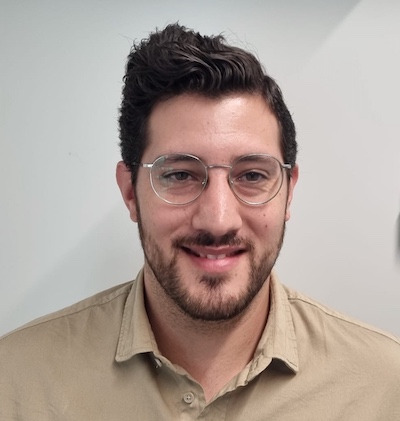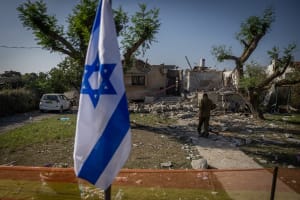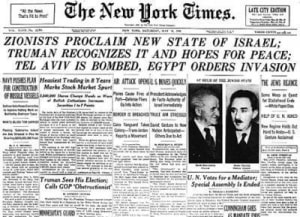‘You can’t fight anti-Israel media bias without fighting the animating ideas,’ says UK media expert
Co-editor of CAMERA UK explains British media’s anti-Israel bias after Oct. 7

While Israel has been fighting for over half a year to destroy the terror group that killed some 1,200 people and kidnapped around 240, the international media has not always been supportive – to say the least.
Unfortunately, as they have done in past similar conflicts, British media outlets again have been standing out as being especially hostile and critical of Israel, even more than they usually are, Adam Levick, an expert for media in the UK, told ALL ISRAEL NEWS.
“The content of anti-Israel media content has expanded by a factor of maybe 20,” Levick said. “Even compared to past conflicts in 2021 and 2014, there’s never been this quantity of content, unfortunately.”
Levick is the co-editor of CAMERA UK, the UK division of the US-based Committee for Accuracy in Middle East Reporting and Analysis (CAMERA).
Antisemitism has always spiked in the Jewish diaspora when Israel has fought wars, especially in the Gaza Strip – but Levick said that this time, something is different.
“One of the things that we’ve noticed as an organization is the impact on people’s attitudes towards Israel and the Palestinians from ideologies such as Diversity, Equity, and Inclusion (DEI), critical race theory, intersectionality, and critical theory,” Levick explained.
These formerly marginal, far-left ideologies have filtered down into the media ecosystem from the universities, he said, and are now driving many of the activist progressives leading the anti-Israel protests.
Those kinds of progressive ideologies, Levick explained, “reduce every conflict in the world, every situation, interaction in the world to a binary – oppressor versus oppressed.”
“And since in their worldview, Israel is the oppressor and the ‘colonizer,’ they simply couldn’t handle the cognitive dissonance of the fact that this unimaginably sadistic massacre was carried out against Jews by Palestinian extremists,” he said.
“So I think the conflict definitely has accelerated this kind of anti-Israel activism. But the reason why it accelerated is because of ideas that I don't think have gotten enough examination by people that are ordinarily prone to support Israel. And I think you can’t fight the bias against Israel in the media without also fighting the ideas that animate the bias.”
Another reason for the pronounced anti-Israel bias in the UK media is post-colonial guilt, Levick said. “They’re projecting their own issues with their colonial history upon Israel."
The worst offenders regarding anti-Israel bias are the Guardian and the BBC, according to Levick. “The Guardian is by far the most hostile English language outlet when it comes to coverage of Israel and promotion or toleration of antisemitic tropes. But the BBC is more dangerous in that they have a global reach.”
The BBC’s slanted reporting has even led the popular Israeli satire show "Eretz Nehederet" (What a Wonderful Country) to satirize the channel in one of its clips.
Renowned Israeli show, Eretz Nehederet, famous for satirizing Israeli figures, takes a dig at international media, including BBC News, for their coverage of Israel's Gaza offensive. #EretzNehederet #BBCNews #Gaza #israel #us #IsraelPalestineWar #Hamas
— GlobalBuzzNow (@GlobalBuzzNow) October 31, 2023
Part 1 & 2
⬇️ pic.twitter.com/OQo4jJ8aoP
A less-known contender in this category is Channel 4, which has gained some notoriety through its hostile interviews during the past months with the popular former spokesman for the Israeli government, Eylon Levy.
“It’s interesting they have very little content about Israel during the year,” Levick noted.
“It’s only when there's a conflict between Israel and terrorists in Gaza that they suddenly leap to cover the region… but during the war, they go full on and pile on Israel. And I’m sure after the war they'll go back to ignoring the country,” he added.
Among the most pernicious types of bias exhibited in the UK media is a hostile framing of the situation between Israel and the Palestinians since October 7, which implies that Hamas’ invasion and massacre was a natural reaction to Israel’s actions.
“The media, especially the Guardian, and others have been pushing this absolutely perverse argument that Israel was in the process of carrying out ethnic cleansing or genocide against the Palestinians.”
“The legitimization of this libel that Israel intends to carry out a genocide against the Palestinians in Gaza has been probably the broadest problem with the media coverage of the war,” Levick said.
Once somebody is convinced by this argument, all the negative consequences of the war “will inevitably be blamed on Israel as opposed to the decisions of Hamas,” he added.
“And pushing back against narratives is obviously much more difficult. Making a broad statement that ‘Israel is committing genocide’ is in many ways harder to refute than when journalists get the numbers of casualties wrong,” Levick emphasized.
One of CAMERA’s main aims is to submit evidence of biased reporting to local authorities and get the media outlets to publish corrections. In a recent example, Levick said, five BBC employees were suspended due to antisemitic social media posts found by CAMERA’s Arabic department.
Another successful correction caused by a CAMERA report came after the organization submitted evidence that the BBC erroneously called Tel Aviv, the capital of Israel, instead of Jerusalem.
Summing up, Levick took care to mention the work of CAMERA’s large campus department and praised its valuable work that started long before the latest wave of antisemitic campus protests broke out across the US.
“We do have a lot of staff and fellows on campuses across North America and the UK that help protect Jewish and pro-Israel students. We support them and promote organizations that are pro-Israel, that push back.”
CAMERA’s campus work provides students with the tools to write pro-Israel op-eds and articles for campus press outlets but also seeks to give them more confidence to stand up for their opinions.
“I remember being an undergraduate student and just not feeling like I had the tools to fight back,” Levick said. “I felt under attack a lot. And I went to university around the time of the First Intifada, and there wasn’t really an organization to help me navigate that very difficult terrain. But CAMERA on campus, that’s its mission.”
We recommend to read:

Hanan Lischinsky has a Master’s degree in Middle East & Israel studies from Heidelberg University in Germany, where he spent part of his childhood and youth. He finished High School in Jerusalem and served in the IDF’s Intelligence Corps. Hanan and his wife live near Jerusalem, and he joined ALL ISRAEL NEWS in August 2022.
















